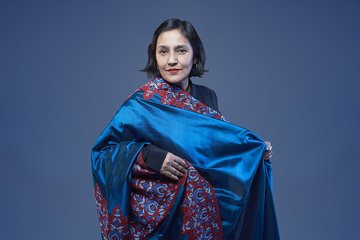
Sutapa Biswas
Indian-born British interdisciplinary artist who draws on personal stories of migration and wider colonial histories to explore themes of race and gender
Place of birth
Date of arrival to Britain
Date of time spent in Britain
1966–present
About
Sutapa Biswas’s family (her parents and siblings) were forced to leave West Bengal in the early 1960s when her father, a university professor, was being censured for his radical political views by the Indian state. They moved to England, having already been forcibly displaced by partition in 1947. Her mother made the journey from India to England alone, with the Biswas children, a voyage that would influence her later work as an artist.
Biswas spent her early years in Southall, an area shaped by its predominantly South Asian community. She went on to study fine art and art history at undergraduate level, moving away from London to the University of Leeds between 1981 and 1985. During this formative period of her art education, she has cited how Griselda Pollock, the feminist art historian, both influenced and was influenced by Biswas in their student–teacher relationship. As an undergraduate student, Biswas campaigned for the decolonization of the curriculum and raised awareness of the unequal power relations of the art world, and society more broadly. She undertook her postgraduate degree at the Slade School of Art, London between 1988 and 1990 and further study and research at the Royal College of Art from 1996 to 1998.
Just after completing her undergraduate degree, her work was selected for artist Lubaina Himid’s exhibition of works by Black female artists, The Thin Black Line (1985). The piece that was chosen was her famous Housewives with Steak-Knives, a mixed-media collage which depicted the Hindu goddess Kali as an everyday ‘housewife’. Through this work she was questioning established tropes about South Asian women in particular roles. In 2009 this work was exhibited again at the Neuberger Museum of Art in New York, where it incited a reactionary response from right-wing Hindu protesters. Previously the work has been spat at in a public viewing. Biswas’s work is seen as controversial, provoking challenging questions about social norms, colonial legacies, race and gender. She also draws on her family’s experiences of migration and displacement to tell these stories. Her film installation Lumen depicts their transformative journey from Mumbai to Dover, using archival material and footage to embed their private narrative within historical contexts of colonial occupation and rule. She finds discoveries in the archive an important part of her artistic and creative processes.
When she is not practising as an artist, she lectures in fine art and art history at institutions such as Chelsea College of Art and Design.
6th Havana Biennial, Cuba, 1997
Black Arts Movement, 1980s
Partition of India, 1947
Biswas, Sutapa and Smith, Marlene, ‘Black Women Artists’, Spare Rib 188 (1988), pp. 8–12
‘Sutapa Biswas Bibliography’, Luxonline (2005), https://www.luxonline.org.uk/artists/sutapa_biswas/bibliography.html
‘At Home: Artists in Conversation, Sutapa Biswas’, Yale Center for British Art (18 February 2022), https://britishart.yale.edu/exhibitions-programs/home-artists-conversation-sutapa-biswas
Bailey, David A., Boyce, Sonia and Baucom, Ian, Shades of Black: Assembling Black Arts in 1980s Britain (Durham, NC and London: Duke University Press, 2005)
Elkin, Lauren, ‘Recognition, at Last, after Decades Decolonizing Art’, New York Times (15 October 2021)
McNay, Anna, ‘Sutapa Biswas – Interview: “I felt questioning established systems of knowledge and power was as vital as breathing”’, Studio International (24 June 2021), https://www.studiointernational.com/sutapa-biswas-interview-baltic-gateshead-kettles-yard-cambridge
Richmond, Una, ‘Sutapa Biswas’, Aware Women Artists (2022) https://awarewomenartists.com/en/artiste/sutapa-biswas/
Sherwin, Skye, ‘Artist Sutapa Biswas: “I wanted viewers to work hard and feel uncomfortable”’, Guardian (11 October 2021)
‘Sutapa Biswas: London, United Kingdom’, Brooklyn Museum, https://www.brooklynmuseum.org/eascfa/about/feminist_art_base/sutapa-biswas
‘Sutapa Biswas’, Kristin Hjellegjerde Gallery, https://kristinhjellegjerde.com/artists/382-sutapa-biswas/biography/
Von Rosenberg, Ingrid, ‘Female Views: Cultural Identity as a Key Issue in the Work of Black and Asian British Women Artists’, in Lars Eckstein, Barbara Korte, Eva Ulrike Pirker and Christoph Reinfandt (eds) Multi-Ethnic Britain 2000+: New Perspectives in Literature, Film and the Arts (Amsterdam: Rodopi, 2008), pp. 228–44
WAL/1/1/2/BISW_SU, Sutapa Biswas, Goldsmiths Library, Special Collections and Archives, London University, London
TGA 200414/2/177, Working file for Audio Arts, Volume 22, No. 4, Tate Gallery Archive, London
TGA 200414/2/70, Additional working file for Audio Arts, Volume 4, No. 1, Tate Gallery Archive, London
Image credit
Sutapa Biswas, taken by Theo Deproost, 23 October 2018, CC BY-SA 4.0, https://creativecommons.org/licenses/by-sa/4.0/ via Wikimedia Commons
Entry credit
Ellen Smith
